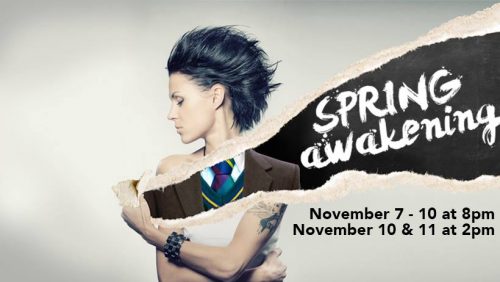Spring Awakening, the newest production by SLU’s University Theatre, is a musical that depicts depression, domestic violence, suicide and sexual taboos. Despite being written in the 1890s, its messages are still extremely prevalent in our society and on our university campus.
The director of the musical, Jen Thomas, stated in the program that it is important to tell this story as many of the characters portrayed in the musical—characters that struggle with depression and who have experienced sexual or domestic violence—are students that go to St. Lawrence. “Whether we like it or not, Wendla and Melchior and Moritz, characters from 120 years ago—are our students,” she wrote in the back of the program. “These young people sit together in our classrooms, visit our offices, eat with us at Dana. Their stories are our stories.”
One student who attended Spring Awakening, Sylvie Holding ’21, was glad that SLU put on the musical, especially because of its risqué topics. “I thought it was cool that our school wanted to put on the performance. I feel like it says a lot about the environment of our campus,” she said.
During the production of Spring Awakening, cast member Alex Cohen ‘22said that because the play explored such challenging topics, the cast became a very tight knit group. “Had the cast not been as close as it had been, it would have been more challenging [to produce such a great show].” The play, he said, was extremely taxing both physically and mentally: “if you look around and see anyone from the cast today, we all look super exhausted.”
Grace Harkins ’21 noticed how the 1896 social and sexual norms expressed in the play are very different than the norms of today. She mentioned that because of the social norms of that time “the mother didn’t provide adequate sexual education to her child” which then resulted in a negative situation. “In our society today, it is more acceptable to have sex before marriage, or at least now its significantly less looked down upon, then it was back then,” said Harkins.
Although the play did bring up important issues, some students feel that the university is not doing enough to actively confront taboo topics. “The musical marks another instance of SLU making public efforts to seem like an open and safe place for victims of sexual assault and trauma. But the way that the university actually handles instances of such events internally leaves a lot to be desired,” said Clare Jenkins, a junior here at St Lawrence University.
St. Lawrence University’s current Statement on Diversity explains that “we [the school] acknowledge the need to challenge previous habits and assumptions understanding the structures of power and injustice in which they exist. We are willing to risk difficulty and discomfort in working towards achieving these goals.”
Hannah Arment ’21 also echoed similar statements as Jenkins when looking at the school with a critical eye: “Having space to talk about sex, sexual violence and domestic violence is a huge step in the right direction. We’ve progressed over the past 5-10 years, but rape culture runs deep through society, culture, and institutions such as St. Lawrence. We still have a long way to go.”
Jen Thomas said she thinks that there are people on this campus who are ready to look in the mirror. “What is the campus culture, and how does it support our students and how does it decimate some of our other students?” Thomas wondered. “To pretend that what happened on stage in Spring Awakening doesn’t happen on this campus, daily, would be foolish,” she said. “To pretend that these things don’t happen here, to pretend that they’re not, is a disservice to our community here I think.”
Spring Awakening is based on the play written by Frank Wedekind in 1896 and was adapted into a musical by Dunken Shiek and Steven Sater in 2006.



